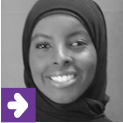
Sahra's Youth Narrative
"It felt like I was helping someone who needed help. I don’t feel like I have the specific tools to help people like that, but she told me at the end of the day, just having a conversation was really helpful and beneficial for her"
As the Covid-19 pandemic shuttered summer programs in 2020, the Police and Youth Engagement Program (PYEP) was revamped to provide essential supports to youth in ethnocultural communities.
Sahra, a third-year accounting student at the University of Alberta, was one of ten Youth Navigators hired to fill the gap left by the cancellation of PYEP.
“As a Youth Navigator, I was serving the Somali community,” she said. “Last year I was a Youth Coordinator with PYEP, so I heard about the new program through Helen. I was interested because last year was so much fun. It was a great experience to help youth from different communities and I wanted to have that experience again.”
Over the spring and summer, Sahra supported about 30 youths aged 15 to 18.
“Some of their families have a lack of understanding of how difficult it is to be an ethnocentric minority here in Canada,” she said. “Their parents don’t understand just how hard it is, or that it’s harder for the youth than the parents.”
Often, powerful support was given through a simple thing like a phone call.
“I supported them by just talking over the phone, providing emotional support and just chatting with them,” she said. “I connected them to resources on how to find jobs and sign up for summer school.
The challenges of offering personal supports during a pandemic were apparent, but the isolation of social distancing measures made those supports even more essential.
“During a pandemic, it’s kind of hard because you don’t get to see the person you’re talking to all the time. So you don’t really know if you’re making a real impact or not,” she said. “Sometimes it’s hard because they just don’t answer the phone and they don’t want to talk.”
But when connections to the youth were made, they were effective and valuable.
“One girl answered the phone all the time and we always talked at least once or twice a week,” said Sahra. “She told me how things were hard at home not having the opportunity to go outside or go to school every day. She didn’t want to run away, she just wanted someone to vent to and talk about what’s going on, so I thought that was really cool.”
“It felt like I was helping someone who needed help. I don’t feel like I have the specific tools to help people like that, but she told me at the end of the day, just having a conversation was really helpful and beneficial for her.”
The simple conversations can be a protective factor, preventing the youth from developing other more difficult challenges when their isolation goes unaddressed.
“I think without this program, definitely their home lives would have been harder because not many of them have great home lives and they can’t express their feelings or emotions to their families,” said Sahra. “So without this program, I don’t know what would have happened, but I think it’s good they have someone to talk to.”
